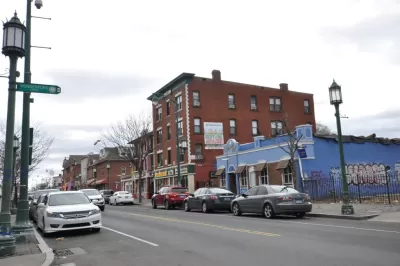The state of Connecticut deploys almost all of its federal housing funding in impoverished communities, according to this bombshell investigatory report.

Jacqueline Rabe Thomas reports from Connecticut as an example of how policy uses low-income housing tax credits to erect pockets of poverty.
"[Connecticut] officials have chosen, year after year, to direct the bulk of public funding for affordable housing to Connecticut’s most impoverished communities," writes Thomas. "Since the mid-1980s, almost $2.2 billion in low-income housing tax credits have been awarded to construct 27,000 affordable housing units in the state. Just 10% were built in prosperous towns, an investigation by The Connecticut Mirror and ProPublica has found."
Some 80 percent of that funding was spent in struggling communities in Connecticut, making it an outlier among a national average which tends toward spending low-income housing money in impoverished areas. "In a recent federal study [pdf] of 21 states, it had the second highest concentration of affordable housing in high-poverty neighborhoods, behind only Mississippi," according to Thomas.
The article traces the systematic origins of these outcomes in Connecticut (e.g., "The state requires developers to obtain local zoning approval before they even apply for a tax credit, a practice that has been flagged by federal regulators as potentially discriminatory) and also the consequences of the pattern for the residents living in subsidized housing in these low-income communities.

Planetizen Federal Action Tracker
A weekly monitor of how Trump’s orders and actions are impacting planners and planning in America.

Restaurant Patios Were a Pandemic Win — Why Were They so Hard to Keep?
Social distancing requirements and changes in travel patterns prompted cities to pilot new uses for street and sidewalk space. Then it got complicated.

Map: Where Senate Republicans Want to Sell Your Public Lands
For public land advocates, the Senate Republicans’ proposal to sell millions of acres of public land in the West is “the biggest fight of their careers.”

Maui's Vacation Rental Debate Turns Ugly
Verbal attacks, misinformation campaigns and fistfights plague a high-stakes debate to convert thousands of vacation rentals into long-term housing.

San Francisco Suspends Traffic Calming Amidst Record Deaths
Citing “a challenging fiscal landscape,” the city will cease the program on the heels of 42 traffic deaths, including 24 pedestrians.

California Homeless Arrests, Citations Spike After Ruling
An investigation reveals that anti-homeless actions increased up to 500% after Grants Pass v. Johnson — even in cities claiming no policy change.
Urban Design for Planners 1: Software Tools
This six-course series explores essential urban design concepts using open source software and equips planners with the tools they need to participate fully in the urban design process.
Planning for Universal Design
Learn the tools for implementing Universal Design in planning regulations.
Heyer Gruel & Associates PA
JM Goldson LLC
Custer County Colorado
City of Camden Redevelopment Agency
City of Astoria
Transportation Research & Education Center (TREC) at Portland State University
Camden Redevelopment Agency
City of Claremont
Municipality of Princeton (NJ)




























